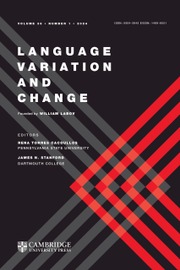Article contents
Gradience, allophony, and chain shifts
Published online by Cambridge University Press: 29 March 2017
Abstract
The monophthongization of /ay/ in the Southern United States is disfavored by following voiceless consonants (price) relative to voiced or word-final environments (prize). If monophthongization is the trigger for the Southern Shift (Labov, 2010) and chain shifts operate as predicted by a modular feedforward phonological theory (cf. Bermúdez-Otero, 2007), this implies price and prize must be two ends of a phonetic continuum, rather than two discrete allophones. We test this hypothesis via distributional analysis of offglide targets and statistical analysis of the effect of vowel duration. As predicted, we find price and prize share a continuous distribution in the Inland South, the region where the Southern Shift probably originated (Labov, Ash, & Boberg, 2006). We use Raleigh, North Carolina, outside the Inland South, as a comparison point; there, the same methodologies indicate price and prize are more discretely separated. Our results thus offer empirical support for the phonological theory that motivated the hypothesis.
- Type
- Research Article
- Information
- Copyright
- Copyright © Cambridge University Press 2017
References
REFERENCES
- 6
- Cited by


